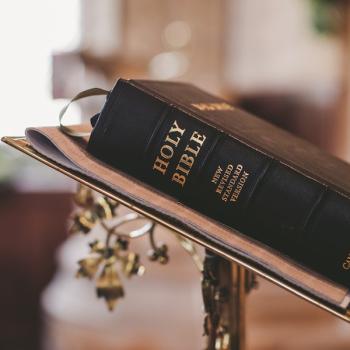How Cerularius reacted to this letter is not known; certainly, he would have found much in it to rouse his anger. However, after receiving it, he did apparently decide to pursue a more conciliatory course with Rome, hoping, possibly, to facilitate another possible military alliance between the Byzantine Empire and the Papacy. In his own words, he was “trying hard to hold [the Pope] as a well-minded and familiar friend, for his aid against the Westerners” (Caer. Petr. III), and so sent more conciliatory letters to him, along with letters from the Emperor to similar effect. At this stage, an ailing Pope Leo made a fateful decision. Rather than merely write another letter, he decided to send an official diplomatic delegation to Constantinople and Cerularius, a delegation consisting of some his most trusted advisers, headed by Cardinal Humbert. The choice of Humbert no doubt seemed fairly obvious; Humbert was not only one of Leo’s closest collaborators, but he had also thoroughly read the anti-Western works and composed several books in refutation of them. At a cursory glance, he seemed by far the most qualified man for the job. Nevertheless, Humbert was a reformer and polemicist, about as far from a diplomat as one could get; and he was soon to prove this fact beyond any doubt.
When the delegation left Rome in early 1054, the Pope was on his last legs, worn out and brokenhearted; by the time it arrived in Constantinople, on June 24th, 1054, he had died. By canon law, the legates’ commissions and positions would likewise have expired with the Pope’s death, and they would possess no further ability to act on behalf of the Papacy. Whether Humbert and his associates were ignorant of Pope Leo’s death, or whether they acted regardless of it is not known.
In any event, our knowledge of what took place then in Constantinople is fairly limited. Both Humbert and Cerularius would later provide fragmentary written accounts of what took place, but these accounts are colored strongly not only by their own perspectives, but also by their own self-interest. Thus, rather than give a blended account of what took place, I will try to recount what happened from each person’s point of view in turn, as they themselves related it. In doing so, I will pass over, for the moment, the question of how much the participants themselves believed their own account of things.
Humbert’s stated perspective on the matter is quite clear, and a written account of it is preserved not only in the excommunication he wrote against Cerularius and his associates, but also in a “brief and succinct account” he wrote after the fact. According to these documents, Humbert came to Constantinople as an extension of the Roman Church, to see “whether the clamor, which without ceasing comes from this great city to her ears, might be ended by our labor– or if it is not so, that she might know it” (Humbert Exc.). Having arrived in the city, the legates went to the Monastery of the Studium to treat with the monk Nicetas, who had written a book against the Western customs of clerical celibacy, fasting on Saturday, and unleavened bread. After disputing with them for a time in the presence of the Emperor and his court, Nicetas was brought to publicly disavow his book and anathematize all those who denied the primacy of Rome or “presume[d] to censure her always orthodox faith in some matter” (Humbert Acc.). The Emperor then ordered Nicetas’ book to be publicly burned. At a later date, Nicetas returned to the legates and again disavowed his earlier opinions, was received into communion by them, and “was made their familiar friend” (ibid). The Emperor receive the legates warmly and supported them in their efforts, even going so far as to have Humbert’s polemical writings translated into Greek and placed in the royal archive. Overall, then, in Humbert’s own words, they found that “pertaining to the leaders of the Empire and her honored, wise citizens, this city is most Christian and Orthodox” (Humbert Exc.).
However, all this time, Cerularius was refusing to meet with the legates or defend himself to them, and so, finally, the legates were driven to take drastic measures. Humbert composed an excommunication, entirely of his own creation, against Cerularius and his supporters, and, on the morning of July 16, 1054, the legates entered the Hagia Sophia while the priests there were preparing to celebrate the Eucharist, and laid the excommunication down upon the altar, crying out: “Whoever will have obstinately spoken against the faith of the Holy, Roman, and Apostolic See and her Eucharist, let him be Anathema Maranatha, nor let him be held a Catholic Christian, but a Prozymite heretic. Fiat, fiat, fiat!” (Humbert). Then, shaking the dust off their feet with the declaration, “Let God see and judge!” (Humbert Acc.), they made to leave the city.
However, at this point, Cerularius decided to intervene, and persuaded the Emperor to bring the legates back to Constantinople. There, he commanded them to attend the Synod of Constantinople to explain themselves; but Humbert and his associates believed not only that Cerularius had “completely corrupted” their excommunication in the translation, but also that he intended to have them torn apart by the mob when it was displayed at the Synod. Thus, the legates refused to attend, and the Emperor supported them in this, finally ordering them to depart the city, since they were no longer safe there. In response, a furious Cerularius incited a popular sedition against the Emperor and the legates, demanding punishment for their actions. Finally, the Emperor was forced to hand the Latin interpreters, who had translated the legates’ words into Greek, over to the mob to be killed. However, at some later point Humbert heard that the Emperor had recovered an accurate Greek translation of their excommunication, and had displayed it as proof of Cerularius’ treachery.












